
CAMBRIAN MEDIEVAL CELTIC STUDIES
Scope & Guideline
Exploring the Heart of Medieval Celtic Heritage
Introduction
Aims and Scopes
- Medieval Literature and Mythology:
The journal emphasizes the exploration of medieval Celtic literature, including mythological narratives and poetic traditions from Welsh and Irish sources, providing critical analyses and new interpretations. - Genealogical Studies:
A significant focus is placed on the genealogical traditions within Celtic societies, examining historical texts and manuscripts that trace lineage and familial connections, particularly in Welsh and Irish contexts. - Historical Contextualization:
The journal aims to contextualize medieval events, figures, and cultural practices within broader European historical frameworks, offering insights into the socio-political dynamics of the Celtic regions. - Linguistic Analysis:
Research on the evolution of the Celtic languages, including studies on language adaptation, translation, and the vernacular's role in medieval texts, is a core area of investigation. - Interdisciplinary Approaches:
The journal encourages interdisciplinary studies that incorporate archaeology, anthropology, and comparative literature to provide a holistic understanding of medieval Celtic societies.
Trending and Emerging
- Identity and Authority:
There is a growing emphasis on the construction of identity and authority in early medieval Celtic societies, exploring how historical narratives and literary texts shape cultural identity. - Digital Humanities:
The application of digital tools and methodologies in analyzing medieval texts is on the rise, with scholars increasingly employing data modeling, text mining, and machine learning for linguistic studies. - Comparative Mythology:
Research comparing Celtic mythological elements with those from other cultures has gained traction, highlighting the interconnectedness of myth across different traditions. - Local Histories and Microhistories:
A trend towards examining localized histories and microhistories within Celtic regions is evident, focusing on specific communities, events, and their unique contributions to broader historical narratives. - Gender Studies in Medieval Contexts:
Emerging themes include an increased focus on gender roles and representations within medieval Celtic literature, exploring how gender dynamics influenced cultural narratives and societal structures.
Declining or Waning
- Cross-Cultural Influences:
Research on the interactions and influences between Celtic cultures and other European societies, while still relevant, has seen less emphasis in recent issues, suggesting a narrowing focus on more localized Celtic studies. - Military History:
Topics surrounding military history, including battles and warfare strategies, have appeared less frequently, indicating a potential shift away from combative narratives towards more cultural and literary analyses. - Celtic Art and Iconography:
Explorations of visual arts and iconography within Celtic societies have decreased, possibly reflecting a growing preference for textual studies over material culture. - Economic Structures:
Studies addressing the economic systems and trade networks of medieval Celtic societies have become less prevalent, suggesting a waning interest in the economic aspects of Celtic life. - Ecological and Environmental Studies:
While relevant, research focusing on the ecological context of medieval Celtic societies, such as land use and resource management, has been less featured, indicating a decline in environmental narratives.
Similar Journals

Afghanistan
Fostering Scholarly Dialogue on Afghanistan's LegacyAfghanistan, published by Edinburgh University Press, is an insightful academic journal dedicated to exploring the rich and multifaceted dimensions of Afghan culture, history, and socio-political dynamics. This journal, which has been publishing since 2018, serves as a crucial platform for interdisciplinary discourse, contributing significantly to fields such as anthropology, archaeology, classics, history, literature, and religious studies. With notable rankings within the Scopus indices, including a Q2 ranking in Literature and Literary Theory, it highlights the importance of Afghan studies within the global academic landscape. Although it operates without an open access model, the journal maintains rigorous peer-review standards, aiming to foster scholarly dialogue and promote a greater understanding of Afghanistan's unique cultural heritage and contemporary issues. Researchers, professionals, and students alike will find valuable insights within its pages, allowing them to engage critically with the complexities of Afghan society and its contributions to broader human narratives.
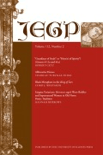
JOURNAL OF ENGLISH AND GERMANIC PHILOLOGY
Illuminating the Nuances of Philological ResearchJournal of English and Germanic Philology, published by University of Illinois Press, stands as a prestigious forum for scholarly discourse in the fields of linguistics and literary studies. With its ISSN 0363-6941 and an impressive impact factor aligning it within the Q1 and Q2 quartiles in key academic categories, this journal delves into nuanced explorations of both the English and Germanic languages, enriching the understanding of language and its literary frameworks. The journal aims to foster interdisciplinary dialogue, offering cutting-edge research that appeals not only to linguists and literary theorists but also to educators and cultural historians alike. Although the journal is not open access, its contributions are essential for anyone keen on enhancing their knowledge of linguistic phenomena and literary narratives from these influential linguistic traditions. With a commitment to publishing innovative and rigorous scholarship, the Journal of English and Germanic Philology is a vital resource for academics seeking to advance their work in language and literature.
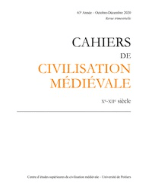
CAHIERS DE CIVILISATION MEDIEVALE
Illuminating History, Literature, and Art of the Medieval EraCAHIERS DE CIVILISATION MEDIEVALE is a distinguished scholarly journal focusing on the multifaceted aspects of medieval civilization, including its history, literature, visual arts, and performing arts. Published by the CENTRE ETUD SUPERIEUR CIV MED in France, this journal serves as a vital resource for researchers, professionals, and students striving to deepen their understanding of the medieval period. Although the journal’s impact factor and HIndex are not explicitly listed, it has been categorized in Q4 for 2023 in key areas such as History and Literature, indicating its role within niche academic discussions. With content spanning converged publication years from 2002 to 2014 and 2017 to 2023, CAHIERS DE CIVILISATION MEDIEVALE aims to foster a rich dialogue among scholars in the field, while its accessibility options provide a pathway for the dissemination of knowledge. Dive into the intricate world of medieval studies through this essential publication, which seeks to elevate the discourse and provide a platform for innovative research.
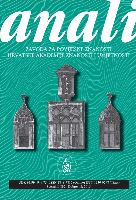
Anali Zavoda za Povijesne Znanosti Hrvatske Akademije Znanosti I Umjetnosti u Dubrovniku
Illuminating the Past, Inspiring the FutureAnali Zavoda za Povijesne Znanosti Hrvatske Akademije Znanosti I Umjetnosti u Dubrovniku, an influential academic journal published by the Croatian Academy of Sciences and Arts, Institute of Historical Sciences in Dubrovnik, serves as a significant platform for research and discourse within the fields of history, archaeology, literature, and cultural studies. Since its transition to Open Access in 1999, the journal has broadened its reach, making scholarly content accessible to a global audience. As a result of its commitment to quality and rigor, it has achieved respectable rankings across various disciplines — notably, a Q3 in Literature and Literary Theory and Q4 in several other categories in the 2023 evaluations. Located in the picturesque city of Dubrovnik, this journal not only highlights the rich historical narrative of Croatia but also contributes to international dialogues on related subjects. Researchers, professionals, and students will find invaluable insights and contemporary discussions in its pages, offering a unique perspective on the intersections of history, culture, and the arts.

De Medio Aevo
Championing Academic Excellence in Cultural Studies and BeyondDe Medio Aevo is a distinguished academic journal published by UNIV COMPLUTENSE MADRID, SERVICIO PUBLICACIONES, dedicated to enriching the fields of Cultural Studies, History, Literature and Literary Theory, Philosophy, Religious Studies, and Visual Arts and Performing Arts. Since its inception in 2012 as an Open Access platform, this Spanish journal has rapidly established its reputation, achieving impressive rankings in various categories with a Q1 classification in Literature and Literary Theory and notable positions in Q2 across other fields as per the 2023 metrics. With an emphasis on rigorous scholarly research, De Medio Aevo seeks to foster the exchange of ideas and insights that reflect the rich tapestry of medieval studies and its ongoing impact on contemporary society. It is an essential resource for researchers, professionals, and students alike, encouraging interdisciplinary dialogue and exploration of the cultural narratives that shape our understanding of history and the arts. Located in Madrid, Spain, the journal is committed to making significant contributions to its fields, with a global reach and a focus on academic excellence.

STUDI MEDIEVALI
Fostering Interdisciplinary Dialogue on Medieval LifeSTUDI MEDIEVALI, published by the Centro Ital Stud Sull Alto Med, is a premier journal dedicated to the exploration of medieval studies, focusing on both cultural and historical dimensions. Since its inception in 2002, this journal has become an essential resource for scholars and students alike, providing critical insights into the complexities of the medieval era. Although it currently operates under a traditional access model, its contributions to the field are undeniable, with a 2023 ranking in the fourth quartile for Cultural Studies and History categories in Scopus rankings, highlighting its niche yet valuable position within academic discourse. Based in Spoleto, Italy, the journal serves as a platform for innovative research and interdisciplinary dialogue, inviting contributions that challenge conventional understandings and stimulate further inquiry into medieval life. Researchers and professionals will find in STUDI MEDIEVALI an opportunity to engage with a community of passionate scholars dedicated to uncovering the multifaceted realities of the medieval period.

Linguistica e Filologia
Unlocking the Depths of Linguistics and Philology.Linguistica e Filologia is a prominent academic journal published by UNIV DEGLI STUDI BERGAMO that offers an Open Access platform since 2002, fostering scholarly communication in the fields of linguistics, philology, and comparative literature. With a commitment to advancing understanding in these disciplines, the journal serves as a vital resource for researchers, professionals, and students alike. Its content encompasses diverse theoretical and empirical studies, critiques, and analyses of language and literature, encouraging interdisciplinary dialogue. Hosted in the picturesque city of Bergamo, Italy, the journal aims to bridge gaps between historical and contemporary linguistic practices, enhancing the global discourse on language studies. With a focus on quality, transparency, and accessibility, Linguistica e Filologia plays a crucial role in shaping the future of linguistic scholarship and is an invaluable reference for anyone interested in the intricate relationships between language and culture.
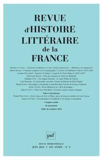
REVUE D HISTOIRE LITTERAIRE DE LA FRANCE
Decoding the Cultural Contexts of French LiteratureREVUE D'HISTOIRE LITTERAIRE DE LA FRANCE, published by Classiques Garnier, is a distinguished academic journal dedicated to the exploration and analysis of French literary history and theory. With an ISSN of 0035-2411 and an E-ISSN of 2105-2689, this journal serves as an essential resource for researchers, professionals, and students in the fields of literature and the humanities. Though it does not currently offer open access, its rigorous scholarship contributes significantly to the understanding of historical literary movements and their cultural contexts. Despite its discontinuation in Scopus after 2016, the journal has a notable academic pedigree, providing critical perspectives on literature from the past to the contemporary era. Situated at 6 Rue de la Sorbonne, Paris 75005, France, the journal aims to enrich the discourse surrounding literary theory and history, highlighting its enduring relevance in today's scholarly landscape.
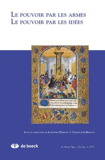
MOYEN AGE
Connecting Past and Present through Scholarly DialogueMOYEN AGE is a distinguished academic journal published by LE MOYEN AGE BOECK & LARCIER S A in Belgium, focused on the multifaceted disciplines of History, Linguistics, and Literature. With its ISSN 0027-2841 and E-ISSN 1782-1436, this journal serves as a platform for researchers, professionals, and students alike to engage with scholarly articles that contribute to the understanding of medieval studies. Although currently categorized in the fourth quartile across various fields as of 2023, MOYEN AGE demonstrates a commitment to fostering academic dialogue and exploration around historical linguistics and literary theory. The journal is available via subscription, making it an essential resource for those looking to deepen their knowledge in its scope, which spans from 2001 through 2024. As it continues to evolve, MOYEN AGE remains a relevant source for emerging thinkers and established scholars drawn to the complexities of the medieval era.

Gripla
Cultivating Knowledge at the Intersection of Language and CultureGripla, published by the Arni Magnusson Institute for Icelandic Studies, stands as a significant academic journal in the fields of linguistics and literary studies. With an ISSN of 1018-5011, this esteemed journal has been releasing cutting-edge research since its inception in 2011. Although currently categorized as Q4 in Linguistics and Language and Q3 in Literature and Literary Theory for 2023, it has showcased robust scholarship with a Scopus rank of #327 in Literature and Literary Theory, placing it within the 70th percentile of its category. Gripla serves as a vital platform for the exploration of Icelandic studies, fostering a deeper understanding of language and literature in a rapidly evolving academic landscape. While it is not an open-access journal, its contributions are essential for researchers, professionals, and students eager to engage with new developments in the linguistics and literary discourse. Situated in the heart of Reykjavik, Gripla continues to enrich the scholarly community by providing insights that bridge traditional knowledge with contemporary relevance.